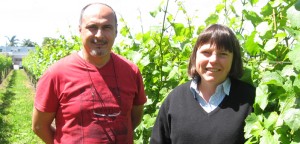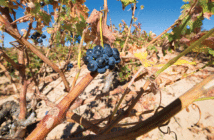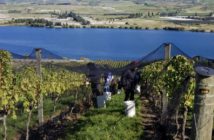An associate professor of viticulture in Turkey, Dr Elman Bahar has recently worked with Eastern Institute of Technology scientists on several industry research projects.

Dr Elman Bahar (left) with Dr Petra King.
From Namik Kemal University in Turkey, Dr Bahar primarily worked with EIT researchers on a study which aimed to establish whether the use of an anti-transpirant spray may be a viable alternative to removing foliage on grapevines – a practice aimed at achieving optimum berry ripeness and wine quality.
Dr Bahar was the first international researcher to be based at EIT on sabbatical. During his three-month stint, he worked with School of Viticulture and Wine Science researchers Dr Petra King and Associate Professor Carmo Saunders-Vasconcelos.
As the growing season got underway, the research team mainly focused on setting up the second year of the study, which is being extended to include sauvignon blanc as well as Merlot. Dr Bahar also helped to develop and train members of EIT’s wine sensory panel, a project established by Dr Vasconcelos.
Dr Bahar has maintained contact with EIT since meeting an international marketing team in Turkey five years ago. Having read about New Zealand’s wine industry in specialist publications, he was interested see it for himself.
While his experience was largely limited to Hawke’s Bay, he says the two countries are very different in terms of their viticulture.
Turkey, he says has a hot climate and the industry encompasses traditional and new methods for making wine.
“New Zealand has cool climate conditions and attracts a lot of rain. Your wines are completely different – they are more aromatic and fruity and floral. In Turkey the wines are more tannic.”
Turkey was among the first countries in the world to domesticate the wild Eurasian grapevine and wine is believed to have been made there for at least 7000 years. It is the world’s fifth biggest grape-growing region, harvesting more than four million tonnes of fruit a year.




























































































